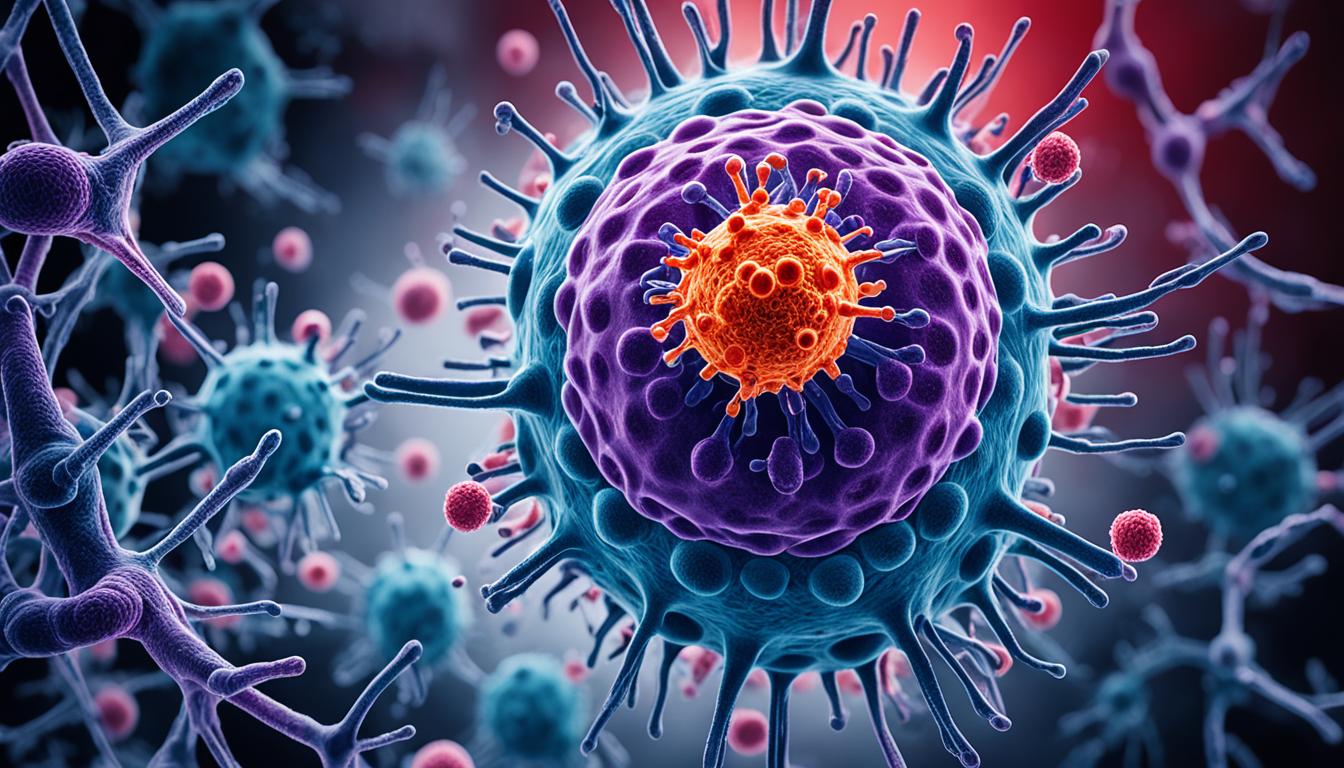Human papillomavirus (HPV) is a common infection spread through sex. It can cause genital warts and raise cancer risks. In the U.S., about 79 million have HPV, and 14 million get it yearly. This virus can lead to cancers in the cervix, vulva, and more.
Vaccines can help stop HPV infections. Also, tests like Pap smears can catch it early. This early action improves the chances of beating the disease.
Key Takeaways:
- HPV is a common sexually transmitted infection that can cause genital warts and increase the risk of certain types of cancers.
- Around 79 million people in the United States have HPV, and 14 million new cases are diagnosed each year.
- Different types of HPV can increase the risk of cancer in various body parts, including the cervix, vulva, vagina, penis, anus, mouth, tonsils, or throat.
- Vaccines are available to prevent HPV infections, and screenings like Pap smears can lead to early detection and better treatment outcomes.
HPV Symptoms and Complications
HPV infections often don’t show any signs and can resolve on their own in about two years. But some types of HPV can cause genital warts. These warts look like small bumps and can make you feel itchy or sore.
Not everyone with HPV will get cancer. Yet, high-risk HPVs can lead to precancerous lesions and up the cancer risk. Cancers like those of the cervix and mouth are linked to HPV.
Most HPV infections clear up without causing harm. But, people with weak immune systems or other risks might face health issues. It’s best for them to take extra care.
Genital Warts
- Genital warts look like tiny bumps or clusters in the genital area.
- They can be different sizes, shapes, and colors like flesh-colored or pink.
- Genital warts can be itchy and painful, especially during sex.
- If you don’t treat them, they could grow in number and size.
HPV-Related Cancers
- Most HPV infections don’t cause cancer. But high-risk types can lead to precancerous cell changes.
- These changes might appear in parts like the cervix and mouth.
- Getting regular checks like Pap smears can find cell changes early.
- Individuals with weak immune systems or who smoke have a higher cancer risk.
HPV Transmission, Risk Factors, and Prevention
HPV spreads mainly through sexual contact, including vaginal, anal, and oral sex. It’s a very contagious virus. It can spread even without visible symptoms.
Here are some things that can make you more likely to get HPV:
- Having many sexual partners
- Not using protection during sex
- Previous history of STIs
- Touching warts or surfaces that were in contact with HPV
Preventing HPV is key. Here’s how you can lower your chances of getting it:
- Get vaccinated: It’s best to get the HPV vaccine before you start having sex. The vaccine can protect you from several high-risk HPV types.
- Use condoms: Always using condoms during sex lowers the chance of getting or spreading HPV.
- Limit how many people you have sex with: Having fewer sexual partners reduces your risk of getting HPV and other STIs.
Comparison of HPV Transmission, Risk Factors, and Prevention
| Transmission | Risk Factors | Prevention |
|---|---|---|
| Sexual contact | Having many sexual partners Not using protection Previous STIs Touching warts or infected surfaces |
Getting the HPV vaccine Using condoms Having fewer sex partners |
By following these steps, you can significantly lower your risk of HPV and its related problems. Taking action helps protect both yourself and others from getting HPV.
HPV Diagnosis and Treatment
HPV is diagnosed with various methods. These include a visual check by your doctor and tests like Pap smears and DNA checks. If cell changes are found, a biopsy might happen. These tests help spot the virus and show if you might get certain conditions.
There is no cure for HPV, but symptoms can be managed. Things like common warts can go away with salicylic acid products. Genital warts might need cryotherapy or surgery to remove them.
Even if warts are gone, the virus might still be there. So, getting regular checks for HPV cancers is very important. This can make treatments more effective if you do get sick.

